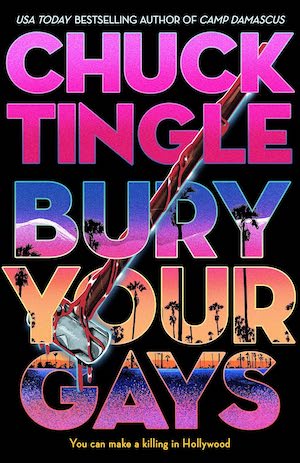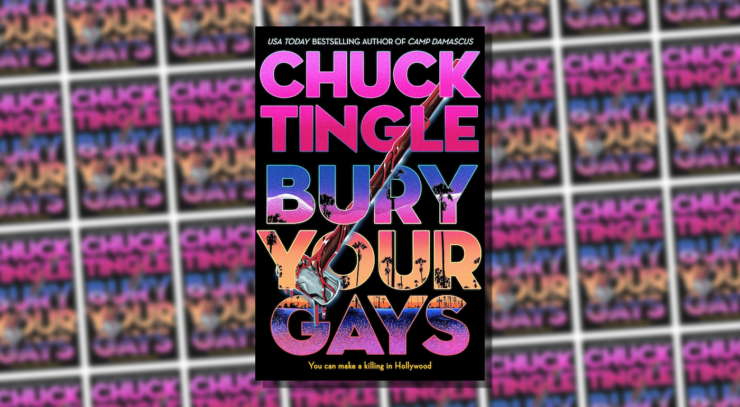If you’ve spent too much time on TVTropes—like I have—then you’ve probably heard the term bury your gays. The term refers to the disproportionate killing of LGBTQ+ characters in media, and a broader sense that queer characters are seen as inherently more expendable or more tragic than their straight counterparts.
While this trope is as old as negative opinions of queerness, it was codified (at least in American media) by the Hays Code, a set of guidelines created by the Catholic Legion of Decency meant to prevent “sinful” behavior from being portrayed on screen. Its more lenient version, updated in the 1950s, still required that any character depicted as queer paid for their crimes, usually via death. And it’s not limited to older media: Fifty years after the end of the Hays Code, a full 10% of all character deaths in TV were queer women, far higher than the mortality rate among straight characters.
Bury Your Gays is also the name of the newest Chuck Tingle novel, a book that actively explores how queer characters are treated—and mistreated—onscreen.
Misha Byrne is a screenwriter for Harold Brothers studio in Los Angeles. His most famous project is the television show Travelers, featuring two female leads with a whole laboratory’s worth of chemistry between them, but nothing confirmed—at least, not yet. Misha plans to reveal their love for one another in the season finale, but then he’s called into a meeting where he’s told that, if he confirms his leads’ lesbian relationship, he has to kill them off. Harold Brothers, riding high on its AI-generated portrayal of a dead actor, have run the numbers and concluded that burying their gays is most profitable.
“Go fuck yourself,” is Misha’s response to that.
Buy the Book


Bury Your Gays
Despite his bravado, however, Misha isn’t sure how he’s going to write himself out of this one—or if he can write himself out. He’s gay, and a significant amount of his film- and television-making is inspired by his queerness or his experiences surrounding it, but he’s never confirmed it publicly, letting viewers choose to read between the lines but retaining plausible deniability. Nor is he out to his family and childhood friends back in Montana, even though he has a longterm boyfriend, Zeke, who he’s certain he’ll ask to marry someday.
A series of strange and bloody events also do nothing to help his writer’s block. Just after leaving his writers’ meeting with Harold Brothers, a falling piano messily crushes one of its longterm cartoonists facing a sexual-harassment lawsuit. A few weeks after that, just as Misha is beginning to recover from the trauma, his own horror-movie villains begin to stalk him. First is The Smoker, a pale ghost with haunting, expressionless eyes who’s never without a cigarette, and who kills you in five days if you don’t give him a light. Next is a black lamb that appears innocent but harbors an eldritch parasite inside it. And appearing on his plane ride from Montana is Mrs. Why, an unnerving figure from the far future—and antagonist from Travelers—who floods her victim’s minds with visions of the end of the universe.
In trying to kill Misha, they threaten to turn him into a queer tragedy himself: a closeted gay man killed before he dares to make his relationship or sexuality public. The core of Bury Your Gays is this fascinating layering: Misha and his friends at Harold Brothers are both creating queer narratives, however they can fit them in under the corporate eye of Harold Brothers, and part of a narrative in which their lives are at stake.
Bury Your Gays doesn’t quite break the fourth wall, but it nods at it—almost de rigueur for a book about storytelling. Misha is a wonderfully realized character, especially in the book’s flashbacks to his childhood. Growing up, Misha was ostracized and punished for being gay, and still holds the memories of his chain-smoking uncle blackmailing him for it, or getting beaten up by his crush Richie after Richie’s older brother caught them together. Tingle is very good at drawing the through line from those experiences to Misha’s screenwriting, the villains and the stories he creates, but despite how real Misha feels, there’s also a sense throughout the book that he’s just a character, and so we should rather think of him in terms of character arc and narrative beats.
It’s a strange, fascinating balance, asking readers to think about what it might feel like, to be locked into a predetermined path, especially one of tragedy or death, with seemingly no way out. The secondary plot of the novel builds on this, dealing with Harold Brothers’ AI-created rendition of actor Chris Oak, and their rights to create artificial versions of any of their employees, actors, or IPs. (This is based on the recent negotiations between film companies and the actors and writers guilds, where one of the unions’ major demands was preventing studios from creating unauthorized AI replicas of performers.) It’s an illustration of everything Bury Your Gays is about, a company being able to exploit tailored queer narratives to pad its profit margins, without benefiting a single real person.
Of course, Bury Your Gays is also a Chuck Tingle novel. Accompanying its tense, gripping horror and metatextual commentary is plenty of celebratory queerness—a brilliant, rainbow-colored world so long as we dare to break out of the narratives prescribed to us.
Bury Your Gays is published by Nightfire.










